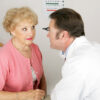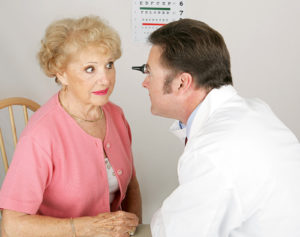
How Vision Clinics Help the Aging Vision Population
As we age, our risk for vision problems increases. Just look at the array of eye conditions that affect individuals 40 and up, and many more popping up for those 60 and older. Conditions like glaucoma, cataracts, macular degeneration, and retinopathy are all commonly associated with advanced age. For this reason, vision clinics catering specifically to the elderly are so important. This is especially true since the number of individuals with age-related eye conditions is expected to jump drastically in the coming years.
In addition to serious vision conditions, such as those listed above, people tend to lose their visual acuity and thus need to add eyeglasses or contacts to their daily routines as they age. Because our eyes are aging, just as our bodies are, seeing a regular eye health professional is key to maintaining both eye health and physical independence.
For those without the resources to visit an ophthalmologist regularly, vision clinics can offer great hope to elderly individuals who want to maintain their eye health.
It’s also super important to note that during an eye exam, life-threatening conditions can be spotted early. Conditions like high blood pressure and diabetes can be seen in the eyes even before you experience any symptoms. So, not only do regular eye exams lend themselves to saving your vision, but possibly saving your life and quality of life as well.
Vision Clinics for Easy Delivery of Low Vision Aids
 In addition to serving as a place for vision testing, disease and complication diagnosis, and eyeglass fitting, vision care clinics bridge a gap between the elderly community and eye health professionals. Because of the range of eye conditions that come with advancing age, basic corrective lenses like glasses and contacts may not be enough. In many cases, seniors need access to a greater range of services, but for many, especially those with strict financial limitations, advanced vision services seem out of reach.
In addition to serving as a place for vision testing, disease and complication diagnosis, and eyeglass fitting, vision care clinics bridge a gap between the elderly community and eye health professionals. Because of the range of eye conditions that come with advancing age, basic corrective lenses like glasses and contacts may not be enough. In many cases, seniors need access to a greater range of services, but for many, especially those with strict financial limitations, advanced vision services seem out of reach.
Vision clinics offer a place where seniors can go to speak with someone about their vision issues. They can also discuss what alternatives may lie outside of corrective lenses. Additionally, eye health professionals have more access to patients, providing them a better chance to discuss and deliver vision correction options.
Low vision options include light filtering lenses, telescopic glasses, and magnifying glasses. Vision clinics can also assist in matching candidates for surgical procedures. Some of these include telescope eye implants, cataract correction, or laser correction procedures. You can also often look into vision therapy at these offices.
Vision Evaluations and Rehabilitation
Few patients know about low vision evaluations, or even that low vision assistance exists. Vision clinics offer a great way to help patients understand low vision, what their options are, and if they are truly suffering from low vision issues. Often, patients either don’t want to believe they have an issue.
If you or someone you know is suffering from low vision and meets any of the below criteria, a consult at your local vision clinic could provide valuable assistance:
- Vision affects daily life
- Vision has forced you to give up hobbies or other loved activities
- Have a harder time reading
- Notice difficulty getting from place to place, especially when you’re unfamiliar with the area
- Have difficulty with everyday tasks such as shaving, applying makeup, or getting dressed
- Experience frequent falls and slips, or find yourself bumping into things more often
Vision clinics can provide therapy and counseling opportunities like:
- Teaching eye movement skills for better use of remaining vision
- Counseling on the effective use of common vision improvement tools like spectacle microscopes, magnifying glasses, and telescopes
- Counseling and education on using alternative measures for improved vision and perception, including larger print, auditory assistance, and effective lighting
Driver Rehabilitation
In some cases, an individual who receives assistance, visual tools, and visual counseling and education can return to driving. However, it isn’t always possible. People who are put in touch with eye exercises and medical procedures to correct vision and compensate for any vision that cannot be restored have the most success in returning to driving.
Elderly individuals interested in this option can discuss it with their clinic ophthalmologist. They can receive visual acuity, ocular-motor skills, visual field, visual memory, and visual attention evaluations both before and after vision treatment. A vision care specialist can also monitor progress and nurture healing and therapy.
Preventing Eye and Vision Issues
Part of working with eye health is preventing conditions and maintaining health. Counseling on methods to treat and/or stop the spread of current conditions is also important. Vision clinics are a great place for this kind of assistance and education to take place. During each visit, an eye health professional can counsel on lifestyle changes for positive vision changes. In addition to therapy, eyeglass fittings, or alternative vision assistance tools, vision care specialists at local clinics will advise patients on prevention and eye health maintenance.
Here are some of the best methods to prevent, treat, and maintain eye health:
- Schedule a yearly comprehensive eye exam with pupil dilation
- Schedule regular physical exams to test for general health conditions that can affect the eyes
- Discuss eye pain, vision changes, and changes to eye appearance with an eye health professional immediately
- Consume a diet packed with fruits and vegetables, limit processed foods, high-fat foods, and foods with artificial ingredients
- Take a regular supplement that contains essential vitamins, minerals, and antioxidants
- Wear protective eye gear when engaging in risky activities
- Wear sunglasses, even in overcast conditions, to shield your eyes from UV rays
- Limit screen time on computers and televisions
- Properly light your home to avoid straining or other damage from low light
- Engage in regular exercise like running, walking, swimming, aerobics, biking, or dancing
Vision clinics truly serve their communities by providing a safe and affordable place for seniors to get their eyes checked. If you or a loved one in your life could use this type of help, do not hesitate to visit your local vision clinic today. Remember, early detection is one of the best preventative measures for most major eye conditions.
Our Rebuild Your Vision Ocu-Plus Formula Contains All 17 Vitamins, Minerals, and Herbal Supplements to Improve Your Eye Health!












Leave Your Reply